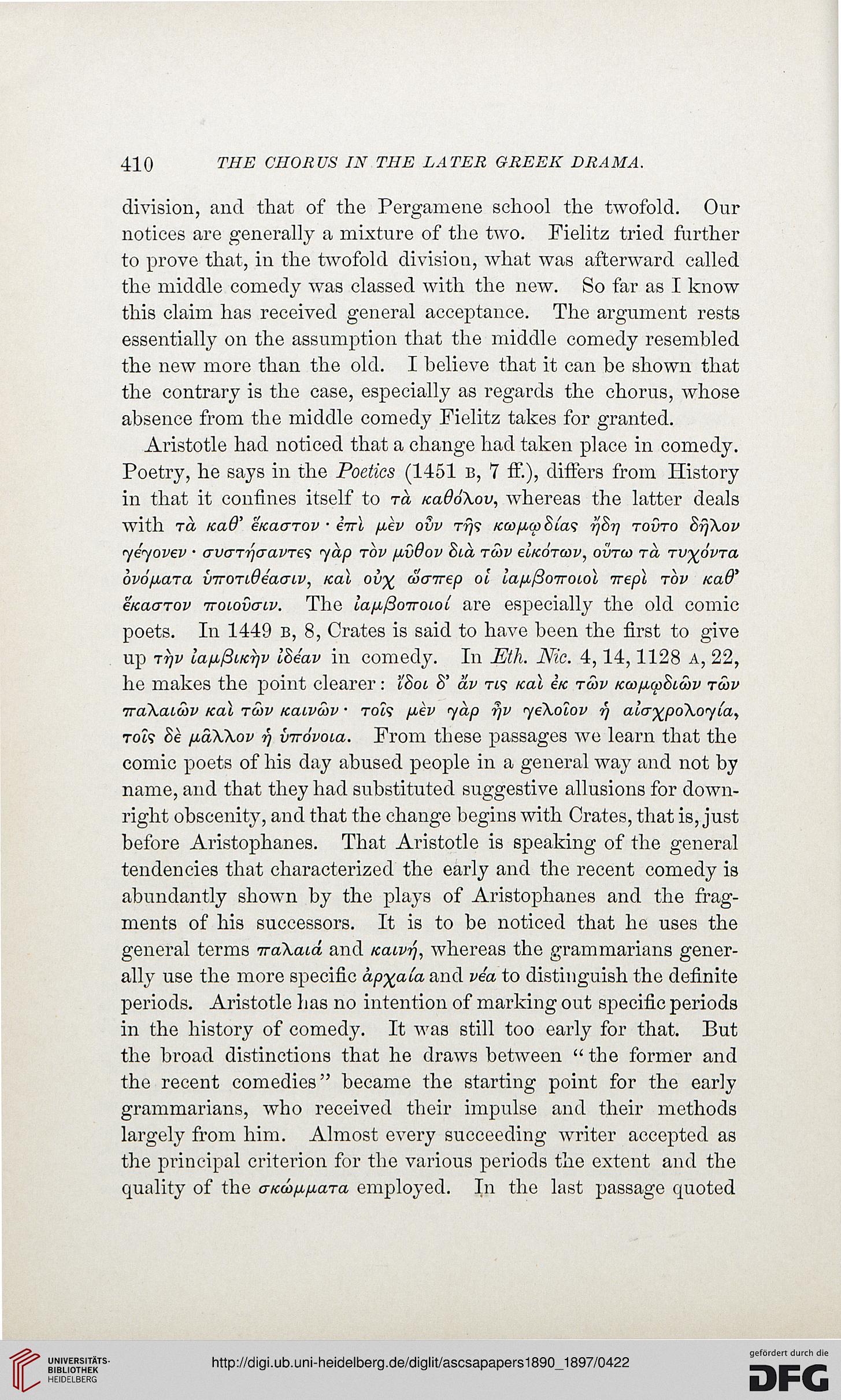410
THE CHORUS IN THE LATER GREEK DRAMA.
division, and that of the Pergamene school the twofold. Our
notices are generally a mixture of the two. Fielitz tried further
to prove that, in the twofold division, what was afterward called
the middle comedy was classed with the new. So far as I know
this claim has received general acceptance. The argument rests
essentially on the assumption that the middle comedy resembled
the new more than the old. I believe that it can be shown that
the contrary is the case, especially as regards the chorus, whose
absence from the middle comedy Fielitz takes for granted.
Aristotle had noticed that a change had taken place in comedy.
Poetry, he says in the Poetics (1451 b, 7 ft.), differs from History
in that it confines itself to rd /ca06\ov, whereas the latter deals
with to Ka0' e/caarov • 67rl fiev ovv tt;? kcopup Bias rjhrj tovto BrjXov
yeyovev ■ avaTrjaavTes yap top pJvQov ?>id tuiv el/corwv, ovrco rd rv^ovra
bvofiara vrroTtOeaaiv, icai ov^ coairep oi iajJifSoiroiol irepl rov icad'
e/caarov iroiovcnv. The lapfioiroLoi are especially the old comic
poets. In 1449 b, 8, Crates is said to have been the first to give
up tt]v la/JL^iKTjv I8eav in comedy. In Eth. Nic. 4,14,1128 a, 22,
he makes the point clearer: Ihoi 8' dv rt? teal ex rS>v /ca/AaSicbv tusv
iraXaiSiv ical twv Kaivwv • tok jxev yap rjV yeXolov rj ala^poXoyia,
rot? Se /jLaXKov rj hirovoia. From these passages we learn that the
comic poets of his day abused people in a general way and not by
name, and that they had substituted suggestive allusions for down-
right obscenity, and that the change begins with Crates, that is, just
before Aristophanes. That Aristotle is speaking of the general
tendencies that characterized the early and the recent comedy is
abundantly shown by the plays of Aristophanes and the frag-
ments of his successors. It is to be noticed that he uses the
general terms iraXaid and Kaivrj, whereas the grammarians gener-
ally use the more specific ap^aia and via to distinguish the definite
periods. Aristotle has no intention of marking out specific periods
in the history of comedy. It was still too early for that. But
the broad distinctions that he draws between " the former and
the recent comedies" became the starting point for the early
grammarians, who received their impulse and their methods
largely from him. Almost every succeeding writer accepted as
the principal criterion for the various periods the extent and the
quality of the aKdap-p-ara employed. In the last passage quoted
THE CHORUS IN THE LATER GREEK DRAMA.
division, and that of the Pergamene school the twofold. Our
notices are generally a mixture of the two. Fielitz tried further
to prove that, in the twofold division, what was afterward called
the middle comedy was classed with the new. So far as I know
this claim has received general acceptance. The argument rests
essentially on the assumption that the middle comedy resembled
the new more than the old. I believe that it can be shown that
the contrary is the case, especially as regards the chorus, whose
absence from the middle comedy Fielitz takes for granted.
Aristotle had noticed that a change had taken place in comedy.
Poetry, he says in the Poetics (1451 b, 7 ft.), differs from History
in that it confines itself to rd /ca06\ov, whereas the latter deals
with to Ka0' e/caarov • 67rl fiev ovv tt;? kcopup Bias rjhrj tovto BrjXov
yeyovev ■ avaTrjaavTes yap top pJvQov ?>id tuiv el/corwv, ovrco rd rv^ovra
bvofiara vrroTtOeaaiv, icai ov^ coairep oi iajJifSoiroiol irepl rov icad'
e/caarov iroiovcnv. The lapfioiroLoi are especially the old comic
poets. In 1449 b, 8, Crates is said to have been the first to give
up tt]v la/JL^iKTjv I8eav in comedy. In Eth. Nic. 4,14,1128 a, 22,
he makes the point clearer: Ihoi 8' dv rt? teal ex rS>v /ca/AaSicbv tusv
iraXaiSiv ical twv Kaivwv • tok jxev yap rjV yeXolov rj ala^poXoyia,
rot? Se /jLaXKov rj hirovoia. From these passages we learn that the
comic poets of his day abused people in a general way and not by
name, and that they had substituted suggestive allusions for down-
right obscenity, and that the change begins with Crates, that is, just
before Aristophanes. That Aristotle is speaking of the general
tendencies that characterized the early and the recent comedy is
abundantly shown by the plays of Aristophanes and the frag-
ments of his successors. It is to be noticed that he uses the
general terms iraXaid and Kaivrj, whereas the grammarians gener-
ally use the more specific ap^aia and via to distinguish the definite
periods. Aristotle has no intention of marking out specific periods
in the history of comedy. It was still too early for that. But
the broad distinctions that he draws between " the former and
the recent comedies" became the starting point for the early
grammarians, who received their impulse and their methods
largely from him. Almost every succeeding writer accepted as
the principal criterion for the various periods the extent and the
quality of the aKdap-p-ara employed. In the last passage quoted




